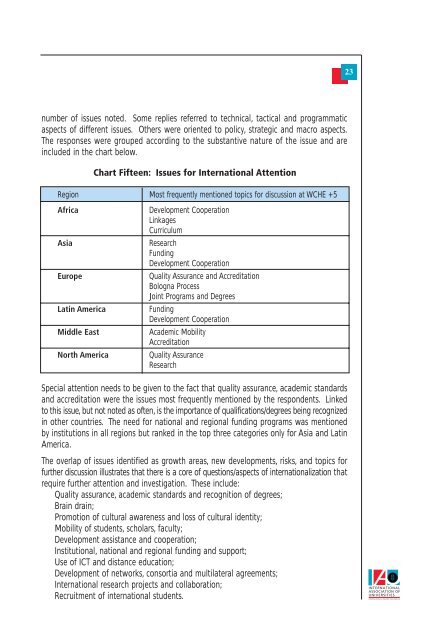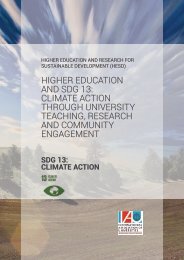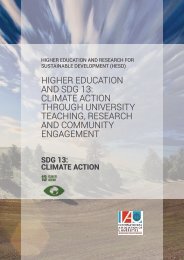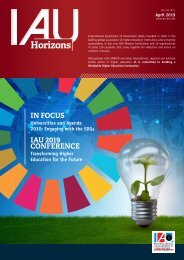Executive summary - IAU 1st Global Survey (2003)
You also want an ePaper? Increase the reach of your titles
YUMPU automatically turns print PDFs into web optimized ePapers that Google loves.
23<br />
number of issues noted. Some replies referred to technical, tactical and programmatic<br />
aspects of different issues. Others were oriented to policy, strategic and macro aspects.<br />
The responses were grouped according to the substantive nature of the issue and are<br />
included in the chart below.<br />
Chart Fifteen: Issues for International Attention<br />
Region Most frequently mentioned topics for discussion at WCHE +5<br />
Africa<br />
Asia<br />
Europe<br />
Latin America<br />
Middle East<br />
North America<br />
Development Cooperation<br />
Linkages<br />
Curriculum<br />
Research<br />
Funding<br />
Development Cooperation<br />
Quality Assurance and Accreditation<br />
Bologna Process<br />
Joint Programs and Degrees<br />
Funding<br />
Development Cooperation<br />
Academic Mobility<br />
Accreditation<br />
Quality Assurance<br />
Research<br />
Special attention needs to be given to the fact that quality assurance, academic standards<br />
and accreditation were the issues most frequently mentioned by the respondents. Linked<br />
to this issue, but not noted as often, is the importance of qualifications/degrees being recognized<br />
in other countries. The need for national and regional funding programs was mentioned<br />
by institutions in all regions but ranked in the top three categories only for Asia and Latin<br />
America.<br />
The overlap of issues identified as growth areas, new developments, risks, and topics for<br />
further discussion illustrates that there is a core of questions/aspects of internationalization that<br />
require further attention and investigation. These include:<br />
Quality assurance, academic standards and recognition of degrees;<br />
Brain drain;<br />
Promotion of cultural awareness and loss of cultural identity;<br />
Mobility of students, scholars, faculty;<br />
Development assistance and cooperation;<br />
Institutional, national and regional funding and support;<br />
Use of ICT and distance education;<br />
Development of networks, consortia and multilateral agreements;<br />
International research projects and collaboration;<br />
Recruitment of international students.





